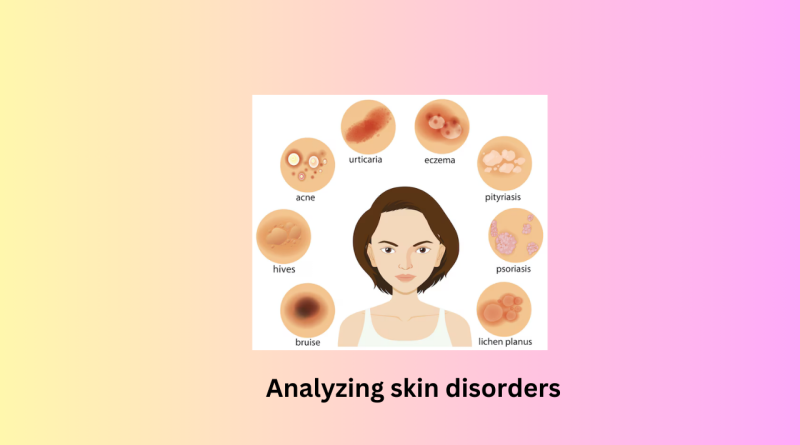Analyzing Skin Disorders
Introduction to Skin Disorders
Skin disorders and diseases are conditions that affect the skin’s appearance, texture, and functionality. These ailments can range from mild irritations to chronic conditions requiring medical intervention. Understanding the various types, causes, symptoms, and treatments for skin disorders is crucial for maintaining healthy skin and overall well-being.
Types of Skin Disorders
Acne
Acne is one of the most common skin disorders, characterized by the presence of pimples, blackheads, and whiteheads. It frequently takes place for the duration of youth because of hormonal adjustments however can persist into adulthood. Factors such as genetics, hormonal imbalance, and environmental factors contribute to its development.
Eczema
Eczema, also known as atopic dermatitis, is a chronic inflammatory condition that causes dry, itchy, and inflamed skin. It is often triggered by allergens, irritants, stress, or changes in temperature. Eczema tends to flare up periodically and can significantly impact one’s quality of life.
Psoriasis
Psoriasis is a chronic autoimmune disorder characterized by the rapid proliferation of skin cells, leading to thick, red patches with silvery scales. The exact cause of psoriasis is unknown, but genetic predisposition and immune system dysfunction play significant roles. Flare-ups may be triggered by stress, infections, or certain medications.
Rosacea
Rosacea is a chronic inflammatory skin condition that primarily affects the face, causing redness, visible blood vessels, and pustules. Moreover, It often develops in adulthood and tends to worsen over time if left untreated. Triggers for rosacea include sun exposure, spicy foods, alcohol, and extreme temperatures.
Causes of Skin Disorders
Skin disorders can be caused by a variety of factors, including genetics, hormonal imbalances, immune system dysfunction, environmental triggers, and lifestyle choices. In addition Understanding the underlying causes is essential for effective treatment and management of these conditions.
Symptoms of Skin Disorders
Symptoms of skin disorders vary depending on the specific condition but may include redness, itching, inflammation, dryness, flakiness, swelling, and pain. Recognizing these symptoms early on can facilitate prompt diagnosis and treatment.
Diagnosis and Treatment
Medical Diagnosis
Diagnosing skin disorders often involves a thorough examination of the skin, medical history review, and possibly diagnostic tests such as skin biopsies, allergy tests, or blood tests. A dermatologist or healthcare professional specializes in diagnosing and treating skin conditions.
Treatment Options
Treatment for skin disorders may include topical medications, oral medications, light therapy, lifestyle modifications, and stress management techniques. The choice of treatment depends on the type and severity of the condition, as well as individual factors such as age, medical history, and lifestyle.
Prevention Tips
Preventing skin disorders involves adopting a skincare routine tailored to your skin type, avoiding triggers such as harsh chemicals and allergens, protecting your skin from the sun, staying hydrated, managing stress, and maintaining a healthy diet and lifestyle.
Living with a Skin Disorder
Living with a skin disorder can be challenging, both physically and emotionally. It’s essential to seek support from healthcare professionals, educate yourself about your condition, practice self-care, and connect with others who may be experiencing similar challenges.
Skin Disorders and Mental Health
Skin disorders can have a significant impact on mental health, leading to feelings of self-consciousness, anxiety, depression, and social isolation. Seeking professional help and engaging in self-care practices can help manage these psychological effects.
Skin Care Routine for Disorders
A skincare routine for individuals with skin disorders should focus on gentle cleansing, moisturizing, and protecting the skin barrier. Avoiding harsh products and allergens, using non-comedogenic products, and incorporating soothing ingredients can help alleviate symptoms and promote healing.
Impact of Diet and Lifestyle
Diet and lifestyle factors play a significant role in skin health. Consuming a balanced food regimen wealthy in fruits, vegetables, complete grains, and lean proteins can help typical pores and skin health. Additionally, avoiding smoking, excessive alcohol consumption, and stress can help prevent flare-ups of skin disorders.
Natural Remedies for Skin Disorders
Some individuals may seek natural remedies to manage their skin disorders, such as herbal supplements, essential oils, and dietary changes. While these approaches may provide symptom relief for some, it’s essential to consult with a healthcare professional before trying any alternative treatments.
Seeking Professional Help
If you’re experiencing persistent or severe symptoms of a skin disorder, it’s crucial to seek professional help from a dermatologist or healthcare provider. They can provide an accurate diagnosis, personalized treatment plan, and ongoing support to manage your condition effectively.
Conclusion
In conclusion, skin disorders and diseases are common conditions that can significantly impact an individual’s quality of life. By understanding the different types, causes, symptoms, and treatment options available, individuals can take proactive steps to manage their skin health effectively. Remember to prioritize self-care, seek professional help when needed, and connect with others for support on your journey to healthy skin.
FAQs
1. Can stress worsen skin disorders? Yes, stress can exacerbate skin disorders by triggering inflammation and hormonal changes in the body. Practicing stress management techniques such as mindfulness, meditation, and exercise can help mitigate these effects.
2. Are all skin disorders treatable? While many skin disorders can be effectively managed with proper treatment and lifestyle modifications, some conditions may require ongoing management and symptom control rather than a cure. It’s essential to work closely with a healthcare professional to develop a personalized treatment plan.
3. Can diet affect skin disorders? Yes, diet can play a significant role in the development and management of skin disorders. Consuming a balanced diet rich in nutrients and antioxidants can support skin health, while certain foods and beverages may trigger flare-ups in susceptible individuals.
4. Is it safe to use natural remedies for skin disorders? Natural remedies such as herbal supplements and essential oils may provide relief for some individuals with skin disorders. However, it’s essential to use caution and consult with a healthcare professional before trying any alternative treatments to ensure safety and efficacy.
5. How can I find the right skincare products for my skin disorder? Finding the right skincare products for your skin disorder involves understanding your skin type, identifying potential



